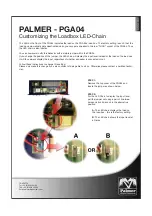
1. Getting started
Connect your instrument (or audio
signal) into the L and R INPUTS, on
the back side. If your insturment or
audio is mono (a guitar for example)
just connect it to any of the inputs.
Then connect the output of the pedal
to your amp or monitors/mixer. If you
only need to use a mono output, you
can use any of the L or R OUTPUT
jacks.
Finally, use a 9VDC, center negative
standard effect pedal’s power supply
with at least 150mA. Darkness is not
a True By Pass effect, and requires
power in order to allow sound to pass
through it.
2. Using Darkness
On power up, the pedal will remeber your last setting and will begin with it by
default. To activate the effect, just press the ON footswitch swiftly. Remember
that the controls are set on a JUMP mode, meaning that their value will not
change unless you move them.
The HOLD footswitch will loop the next (after the button is pressed) 150ms of
you current input. If no singal is send, this will not have anythign to loop, thus the
switch will kill the effect.
While on hold, no new input is processed, but you can still use the controls to
process the looped sound.
There are 3 control pages:
A. The main controls page that include the actual controls you read on the panel.
B. The secondary controls page , that you can access while holding the ON
footswitch down
C. The GATE controls page , which you can access while holding the HOLD foot-
witch down
For a detailed visual view, check next page.
SPECIFICATIONS
- CMOS Buffered Bypass
- 9VDC center pin negative
supply 150mA at least
-True stereo
- All IN/OUT are TS mono
jacks
- dimensions: 14x10x5 cm
- weight: 0,525 kg
- Spread: Reverb size
- Mix: Dry / Wet balance
- Decay: Reverb decay time
- Control:
It depends on the Mode switch
position
switch on 1 = Shifter semitone
( +/-12). 50% is no pitch
switch on 2 = Shifter mix
- Spread: No Function
- Mix = Reverb filter. Left for Low
Pass Right for High Pass
- Decay = LFO depth. No LFO at 50%.
Left for Sample and Hold, Right for
Triangle
- Control = LFO rate. The LFO always
targets the Spread.
- Mode switch = Tails On/Off. Left is
Off. Having the tails On, will allow the
Reverb Tail to be audible, even if the
effect is turned OFF via the Left
footswitch.
- Spread: No Function
- Mix = Threshold. Controls the ease that
the gate closes
- Decay = Attack time. After the gate
opens, controls the time it will take for the
effect to reach the max programmed
volume
- Control = Release time. After the gate
closes, controls the time it will take for the
effect close
- Mode switch = Gate On/Off. Left is Off.
Having the Gate Off, the knobs will
have no effect.





















